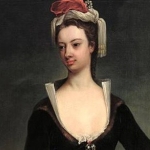SILLIANDER and PATCH. THOU so many favours hast receiv'd,
Wondrous to tell, and hard to be believ'd,
Oh ! H—— D, to my lays attention lend,
Hear how two lovers boastingly contend ;
Like thee successful, such their bloomy youth,
Renown'd alike for gallantry and truth.
St. JAMES's bell had toll'd some wretches in,
(As tatter'd riding-hoods alone could sin)
The happier sinners now their charms put out,
And to their manteaus their complexions suit :
The opera queens had finish'd half their faces,
And city-dames allready taken places ;
Fops of all kinds to see the Lion, run ;
The beauties stay till the first act's begun,
And beaux step home to put fresh linen on.
No well-dress'd youth in coffee-house remain'd,
But pensive PATCH, who on the window lean'd ;
And SILLIANDER, that alert and gay,
First pick'd his teeth, and then began to say.
SILLIANDER. Why all these sighs ? ah ! why so pensive grown ?
Some cause there is that thus you sit alone.
Or dost thou envy where the ladies love ?
PATCH. If, whom they love, my envy must pursue,
'Tis sure, at least, I never envy You.
SILLIANDER. No, I'm unhappy, You are in the right,
'Tis You they favour, and 'tis Me they slight.
Yet I could tell, but that I hate to boast,
A club of ladies where 'tis Me they toast.
PATCH. Toasting does seldom any favour prove ;
Like us, they never toast the thing they love.
A certain Duke one night my health begun ;
With chearful pledges round the room it run,
Till the young SILVIA press'd to drink it too,
Started, and vow'd she knew not what to do :
What, drink a fellow's health ! she dy'd with shame :
Yet blush'd whenever she pronounc'd my name.
SILLIANDER. Ill fates pursue me, may I never find
The dice propitious, or the ladies kind,
If fair Miss FLIPPY's fan I did not tear,
And one from me she condescends to wear.
PATCH. Women are always ready to receive ;
'Tis then a favour when the sex will give.
A lady (but she is too great to name)
Beauteous in person, spotless is her fame,
With gentle strugglings let me force this ring ;
Another day may give another thing.
SILLIANDER. I cou'd say something — see this billet-doux —
And as for presents — look upon my shoe —
These buckles were not forc'd, nor half a theft,
But a young Countess fondly made the gift.
PATCH. My Countess is more nice, more artful too,
Affects to fly that I may fierce pursue :
This snuff-box which I begg'd, she still deny'd,
And when I strove to snatch it, seem'd to hide ;
She laugh'd and fled, and as I sought to seize,
With affectation cramm'd it down her stays :
Yet hop'd she did not place it there unseen,
I press'd her breasts, and pull'd it from between.
SILLIANDER. Last night, as I stood ogling of her Grace,
Drinking delicious poison from her face,
The soft enchantress did that face decline,
Nor ever rais'd her eyes to meet with mine ;
With sudden art some secret did pretend,
Lean'd cross two chairs to whisper to a friend,
While the stiff whalebone with the motion rose,
And thousand beauties to my sight expose.
PATCH. Early this morn — (but I was ask'd to come)
I drank bohea in CÆLIA's dressing-room :
Warm from her bed, to me alone within,
Her night-gown fasten'd with a single pin ;
Her night-cloaths tumbled with resistless grace,
And her bright hair play'd careless round her face ;
Reaching the kettle, made her gown unpin,
She wore no waistcoat, and her shift was thin.
SILLIANDER. See TITIANA driving to the park,
Hark ! let us follow, 'tis not yet too dark ;
In her all beauties of the spring are seen,
Her cheeks are rosy, and her mantle green.
PATCH. See, TINTORETTA to the opera goes !
Haste, or the crowd will not permit our bows ;
In her the glory of the heav'ns we view,
Her eyes are star-like, and her mantle blue.
SILLIANDER. What colour does in CÆLIA's stockings shine ?
Reveal that secret, and the prize is thine.
PATCH. What are her garters ! tell me if you can ;
I'll freely own thee for the happier man.
Thus PATCH continued his heroic strain,
While SILLIANDER but contends in vain.
After a conquest so important gain'd,
Unrival'd PATCH in ev'ry ruelle reign'd.



















Comment form: